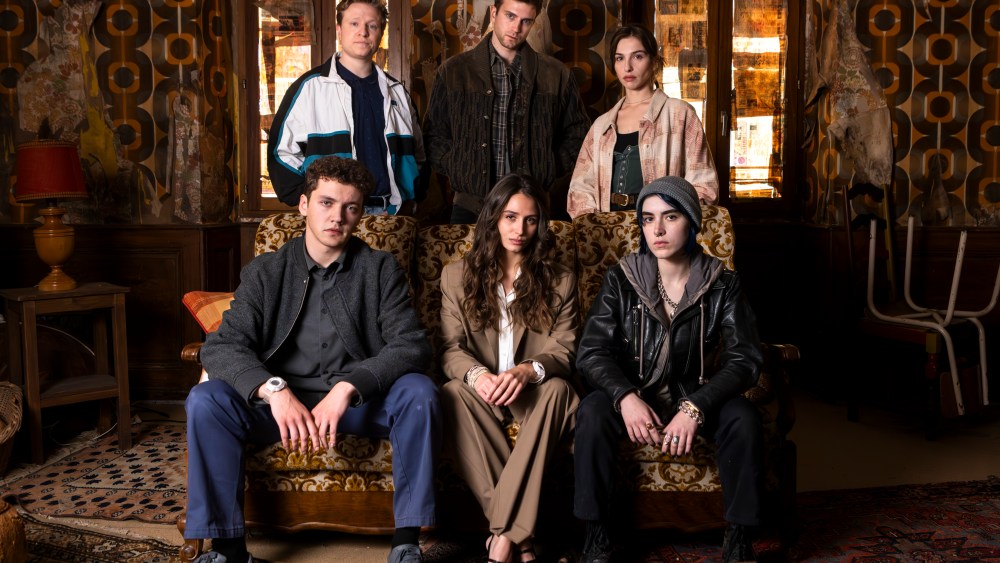“After Us,” an ecological thriller created by Louis Aubert and Matthieu Bernard, follows a group of angry young activists who decide to kidnap the children of corporate leaders in order to force their companies to truly commit to environmental protection.
The six-part series, produced by Les Films du Cygne and Storia Television for France Télévisions and Germany’s ZDF and distributed internationally by Mediawan Rights, is making its market debut at the Unifrance Rendez-Vous in Le Havre. The series is co-produced by Germany’s Maze Pictures, Sequel Prod in Belgium and the European public broadcasting initiative New8 (of which ZDF is a partner).
Speaking with Variety ahead of the Rendez-Vous, Aubert and Bernard, director Franck Brett and producers Alexandre Charlet and Nicolas de Saint Meleuc discuss the making of the series, the impact of climate change and the fine line between activism and extremism.
“Our intention was to make a series about climate change, which is a very difficult thing to do, because, for most people, it’s a problem for the future,” Aubert explains. “We wanted to say with this series, that, in our opinion, it’s a problem of today. We can see that, due to climate change, there are of course fires, heatwaves and floods but there’s also tension in society and especially between the generations.”
Thus the idea was born to “talk about this young generation trying to do something because they have the feeling that the boomers aren’t doing enough.”
The first episode very much captures the anger felt by young people at complacency towards climate change.
“This anger exists and we wanted to talk about it,” Aubert adds. “It’s the starting point, this anger. But what is important for us is to say loud and clear that it’s not the solution and that we have to find another way. We don’t have to argue with each other; we don’t have to fight each other. We have to discuss. We have to find solutions all together, and that’s the whole point of the series.”
Indeed, while the protagonists see their motivation very much as existential – to save the planet – the series also explores their individual backstories and what actually drove them to join the group, De Saint Meleuc adds.
The series deals with “the fear of young people and the lack of a positive perspective and what this can lead to,” Bernard notes. “This is the first generation whose radicalism is manifested not in the order to bring about a better world, but in the hope of preserving their own world.”
The story also draws a fine line between passionate activism and terrorism, a balance that posed major challenges but also great dramatic potential.
The blurring of that line “is why the show is interesting,” Aubert notes. “Of course, you want to like them because they are idealistic. Everybody thinks they are right, but they are doing something wrong.”
There are also parallels with the seemingly unscrupulous corporate CEOs. The storyline gets more complicated as it unfolds and ultimately everybody is facing the same problem, Aubert adds.
“There is no bad buy or good guy in the story,” Brett stresses, noting that viewers will be challenged by the fact that protagonists are doing a very bad thing in kidnapping young people, even possibly committing terrorism, while remaining very human, even seemingly touching in their behavior. “This is exactly what we love in the show.”
That conundrum was also highlighted by the creators in initially pitching the project, Charlet recalls. “We liked to to say that [it] questions our reason, our morale and our ethics.”
Aubert adds: “It was very interesting to write a series about people doing something wrong for a right cause. I think it was the same for the actors, and I think that bound us together.”
“And we like to say also that it is not a true story … yet,” Charlet quips.
The cross-border scope of the series, including the role of international oil, chemical and financial corporations in the climate crisis, is likely to attract strong global interest. Indeed, ZDF was the first broadcaster to board the project. In addition to French talent, including Léo Legrand, Marie Colomb, Gaël Langouet, Matéo Paitel and Natacha Lindinger, the cast features German, Spanish and British actors in key roles, among them Benno Fürmann, Catalina Del Rosario, Jonathan Nyati, Will Attenborough (“Dunkirk”), Alva Schäfer (“The Light”) and Pauline Pollmann.
“From a creative point of view, it was obvious at the beginning when we started reflecting on the show, that it couldn’t be just French, that we had to talk about all of Europe, because the climate change issue has no frontier,” Aubert notes. “And it’s now become universal.”
“After Us” was shot in France’s scenic Auvergne-Rhône-Alpes region, including locations in and around Annecy, the Grésivaudan Valley in Isère, Haute-Savoie and Lyon.
